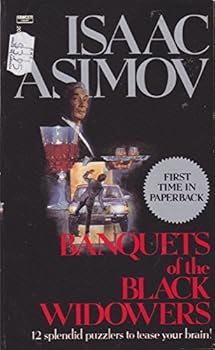Banquets of the Black Widowers
(Book #4 in the The Black Widowers Series)
Select Format
Select Condition 
Book Overview
No Synopsis Available.
Format:Mass Market Paperback
Language:English
ISBN:0449209806
ISBN13:9780449209806
Release Date:April 1986
Publisher:Fawcett Books
Weight:0.34 lbs.
Dimensions:0.6" x 4.2" x 6.9"
Customer Reviews
3 ratings
How do you justify your existence?
Published by Thriftbooks.com User , 19 years ago
These twelve puzzles are largely without violence and in similar format; the evening begins with drinks and good-natured (?) abuse among the six gentlemen. After dinner, the invited guest is grilled starting with the question "How do you justify your existence". Invariably a mystery presents itself, which the diners probe, and then it is the water Henry who offers the key point of the solution. The fun of these stories is the inventiveness of the problems. Only a writer as broad as Asimov could combine the math of Goldbach's conjecture and the poetry of Milton in a single story. I also enjoyed the self-depredation in "The Phoenician Bauble" where Asimov is referred to as "Asimov? Isn't he Manny's friend, the one even more stuck on himself than Manny?". Two of the stories do not follow the exact format: in "The Good Samaritan", a woman (normally not allowed) presents her case (but is not allowed in for dinner), and in "The Intrusion" a man bursts in uninvited. I enjoyed Asimov's afterwards in each story, where he talks about editors, titles, and after "the redhead" admits he dreamed the story. So listen to all the clues, try to solve it, but then failing that (I think I only guessed two), listen to Henry the waiter as he solves it.
Solving mysteries via conversation between friends
Published by Thriftbooks.com User , 20 years ago
The black widowers are a group of men that meet for dinner and conversation. They rotate the hosting duties and the host for the meeting is allowed to bring a guest. The primary precondition that the guest must agree to is that they will be subjected to a grilling and all questions must be truthfully answered. Through the course of the grilling a mystery is posed and the black widowers attempt to solve it. Henry, the waiter and also a member of the group, eventually solves the problem after the other members have reached an impasse. The mysteries are not of great depth, these are short stories, so there is not enough text to develop a very complex problem. However, they are excellent light reading, and the solutions are generally easy to understand. In most cases, they are obvious after you read Henry's explanation. Twelve simple brain teasers that will tickle your brain, each of these stories is a joy to read.
The 4th volume of Black Widowers stories
Published by Thriftbooks.com User , 23 years ago
The Black Widower acting as host for the monthly banquet at the Milano Restaurant traditionally brings a guest for grilling, which begins with the question 'How do you justify your existence?' but ends with ferreting out some mystery to be solved. The seventh Black Widower - Henry, the waiter - always solves the problem after the other six have cleared the ground a bit. The problem usually isn't a crime - just some little puzzle that's been driving the guest crazy. The puzzles are fair; however, be warned that some are comparable to, say, some Lord Peter Wimsey stories, in that the reader must have a smattering of history, literature, and/or popular science to have enough information to work out the answer. "Sixty Million Trillion Combinations" (a.k.a. "14 Letters") - Host: Trumbull. Guest: none. Trumbull (who stipulates that he cannot justify his existence) must solve a cryptogram involving two mathematicians working for the U.S. government. The burly Sandino enjoys scoring off Pochik, who, although a brilliant mathematician, is sensitive about not having a well-rounded education. (He had to work his way through school as a waiter). Pochik, in a fit of temper, finally retaliated by yelling that he'd show who was best, when his pet project was ready for publication. Sandino has trumped Pochik by publishing first, claiming that he reached the same conclusions independently. Pochik maintains that Sandino somehow breached his password-protected account. Trumbull's assignment is to work out what the 14-letter password is, to show how Sandino could have cracked it among the 60 million trillion possible combinations. "The Woman in the Bar" (originally published in EQMM as "The Man Who Pretended to Like Baseball") - Host: Rubin. Guest: Darius Just, one of Asimov's independent characters, who also appears in MURDER AT THE ABA, who once got into trouble for an unusual reason. "The Driver" - Host: Drake. Guest: Kurt Magnus, who recently attended a SETI conference at which one of the drivers may have been murdered for unwittingly uncovering a breach in security. "The Good Samaritan" - Host: Gonzalo. Guest: Barbara Lindemann (Gonzalo is painting her portrait). (Since the club allows no women at their meetings, the revelation of why Gonzalo's guest is eating downstairs rather than with the club presents...difficulties.) She was so shaken at being mugged recently that she cannot remember the name and address of the young stranger who rescued her, in order to thank him. "The Year of the Action" - Host: Avalon. Guest: Herb Graff, who is working with a pair of Gilbert and Sullivan enthusiasts to make an animated version of THE PIRATES OF PENZANCE. The two experts, though, are embroiled in a knock-down, drag-out argument about one small detail. As Graff points out, the Widowers have lots of stuff to fight about, so they drop each argument and get on with their lives, but these two, obsessed with only one thing, are stopped cold until they can work it out.






